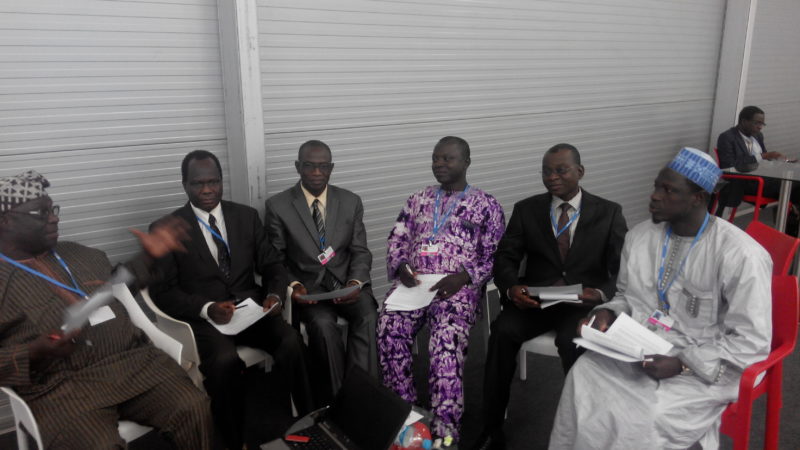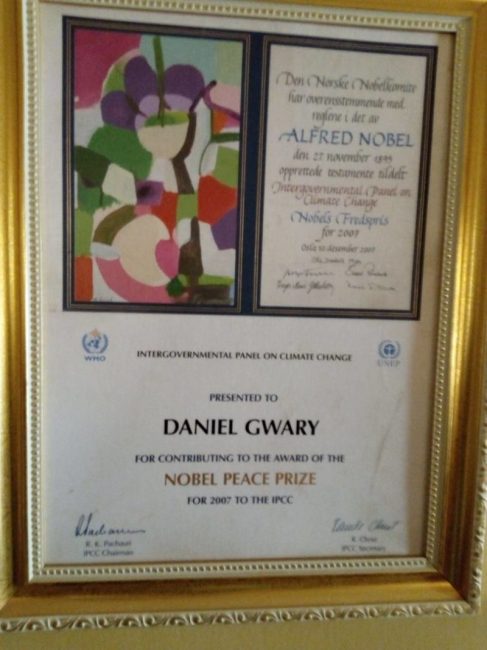Nigerian scientists have been reacting to the news that broke on Friday, April 6, 2018 that seven of their colleagues were included among the 721 experts from 90 countries invited by the Intergovernmental Panel on Climate Change (IPCC) to participate in the Sixth Assessment Report (AR6) as authors and editors.

The Nigerians are:
- Hyacinth Nnamchi of the University of Nigeria, Nsukka (Working Group I – Chapter 2: Changing state of the climate system) as Lead Author
- Ms Ibidun Adelekan of the University of Ibadan, Ibadan (Working Group II – Chapter 9: Africa) as Coordinating Lead Author
- Ayansina Ayanlade of the Obafemi Awolowo University, Ile-Ife (Working Group II – Chapter 9: Africa) as Lead Author
- Chukwumerije Okereke of the University of Reading, UK (Working Group III – Chapter 1: Introduction and Framing) as Coordinating Lead Author
- Ms Chioma Daisy Onyige of the University of Port Harcourt, Port Harcourt (Working Group III – Chapter 5: Demand, services and social aspects of mitigation) as Lead Author
- Ogheneruona Diemuodeke of the University of Port Harcourt, Port Harcourt (Working Group III – Chapter 10: Transport) as Lead Author
- Sanusi Mohamed Ohiare of the Rural Electrification Agency (Working Group III – Chapter 15: Investment and finance) as Lead Author
The Sixth Assessment Report, according to the IPCC, will inform policymakers, international climate negotiators and other stakeholders about the latest knowledge on all aspects of climate change.
In a response to the development over the weekend, the experts expressed divergent views. While congratulating the nations and the new authors on the development, they want this to be used as an opportunity to express developmental challenges faced by Nigeria in particular and the developing world in general. Some of them questioned the criteria used to select the authors.
“What criteria did IPCC use in arriving at the seven experts and how were they selected?” demanded Prof Nasiru Idris of the Nasarawa State University, Keffi.
Ako Amadi of the Community Conservation and Development Initiatives (CCDI) spoke in a similar vein, saying: “On what criteria did IPCC base its selection? I expected to see expertise of nominees in a balance of climate adaptation problems in Nigeria. But this has been also an internal Nigerian culture which it appears the IPCC has adopted.”
Nonetheless, Prof Idris expressed joy at the selection. His words: “I am happy to hear that Nigerians are part of the team of experts that will determine the outcome of the next IPCC report.
“The implication for Nigeria is that our input from the Nationally Determined Contributions (NDCs) and some outcome of the results of our scientific researchers on how climate change has impacted on the country will be part of the scientific evidence in the AR6.
“My advice for my colleagues that make the list of experts is that their voices must be heard in the report, and they should also look at the pros and cons of the AR5 in relation to African environment.”
Prof Olukayode Oladipo of the University of Lagos, a former IPCC report author, said: “I am really happy that seven Nigerians are among the chosen experts to put the AR6 of the IPCC in shape. It will be a great experience as I had with the first IPCC Report as a contributing author for two chapters. I have no doubt that they will excel.”
Prof Daniel Gwary of the University of Maiduguri, who was part of AR3 and AR4 as well as IPCC Special Report on Climate Change and Water, submitted: “This is a good development for Nigeria since the IPCC has maintained the number of Nigerian participants with a slight increase as a sign of appreciating contributions from our scientists and experts. It is also good for Nigeria because this team from Nigeria is a new crop of experts helping to increase our expertise in the IPCC process and global climate change discuss.
“Our team members should see their choice as a privilege to represent the country and the global community. The work is enormous, challenging and requires sacrifice of time more especially those who will be Coordinating Lead Authors (CLAs).
“I will like to advise our authors to use the abundant examples in our country to project how climate change affects Nigeria and by implication the vulnerability of the West African region and various efforts being made for adaptation and mitigation.

“I will also like the government through the Federal Ministry of Environment to recognise these experts properly and work closely with them all through the period of their assignment. When I, along with others served in the AR3 and AR4 that earned us part in the 2007 Nobel Peace Prize, there was very little acknowledgement of that achievement from our government and this shouldn’t be the case in future.
“I wish them well in their assignment. They should also seek to be involved in the preparations of other IPCC special reports that may come up.”
Nnimmo Bassey of the Health of Mother Earth Foundation (HOMEF) stated: “We note that the experts have been selected based on their competence in the respected fields. The implication of this for Nigeria is that we cannot claim not to know what needs to be done to help the world step back from impending climate chaos that would result from either climate inaction and wrong-head actions. With this level and concentration of expertise on our shores it speaks poorly of not just our country but of our regions if our governments approach climate negotiations without adequate and holistic preparations. The burden is also on government to ensure that climate considerations are fully integrated in infrastructure planning and other national efforts to enhance the well-being of the people.
“The authors have been picked for specific tasks and areas. They will do well to bear in mind that climate impacts don’t appear in silos. This means that the scientific approach must nevertheless keep in view the network of connections between the discrete sectors and conclusions and recommendations must be viewed through the prism of climate justice, the original bedrock of the climate negotiations. We expect the experts to stand up and call out players that have knowingly entrenched practices that have compounded the climate crisis.
“For example, it has become known that major fossil fuel companies like Exxon and Shell known for decades that their products have literally locked the world on the pathways of irreversible or intolerable climate change and have wilfully pressured policy makers from taking actions for shift energy transitions, for example.
“I think that more than at any other time, our government has to take concrete steps to stop gas flaring and invest in restoring our forests and wetlands as veritable climate actions.”
The following served as Lead Authors in the preparations of the AR3 of IPCC: Prof A. O. Adegbulugbe of Obafemi Awolowo University, Ile-Ife (OAU), Prof James Adejuwon of OAU (now retired), Prof James C. Nwafor of the University of Nigeria, Nsukka (now retired) and Prof Daniel Gwary of the University of Maiduguri.
In the AR4 report, the Nigerian experts were: Prof A. O. Adegbulugbe of the OAU, Prof Daniel Gwary of University of Maiduguri, Prof Francis L. Ibitoye of OAU, Prof Anthony Nyong (was CLA) and Prof Imogen Obioh of OAU.
In addition to the above-mentioned LA and CLAs, there were few others who were co-opted to serve as Contributing Authors and Review Editors.
“I am not sure of how many served in the AR5 preparation but, from the analysis above, Nigeria has a better representation in the AR6 writing team,” said Prof Gwary.
